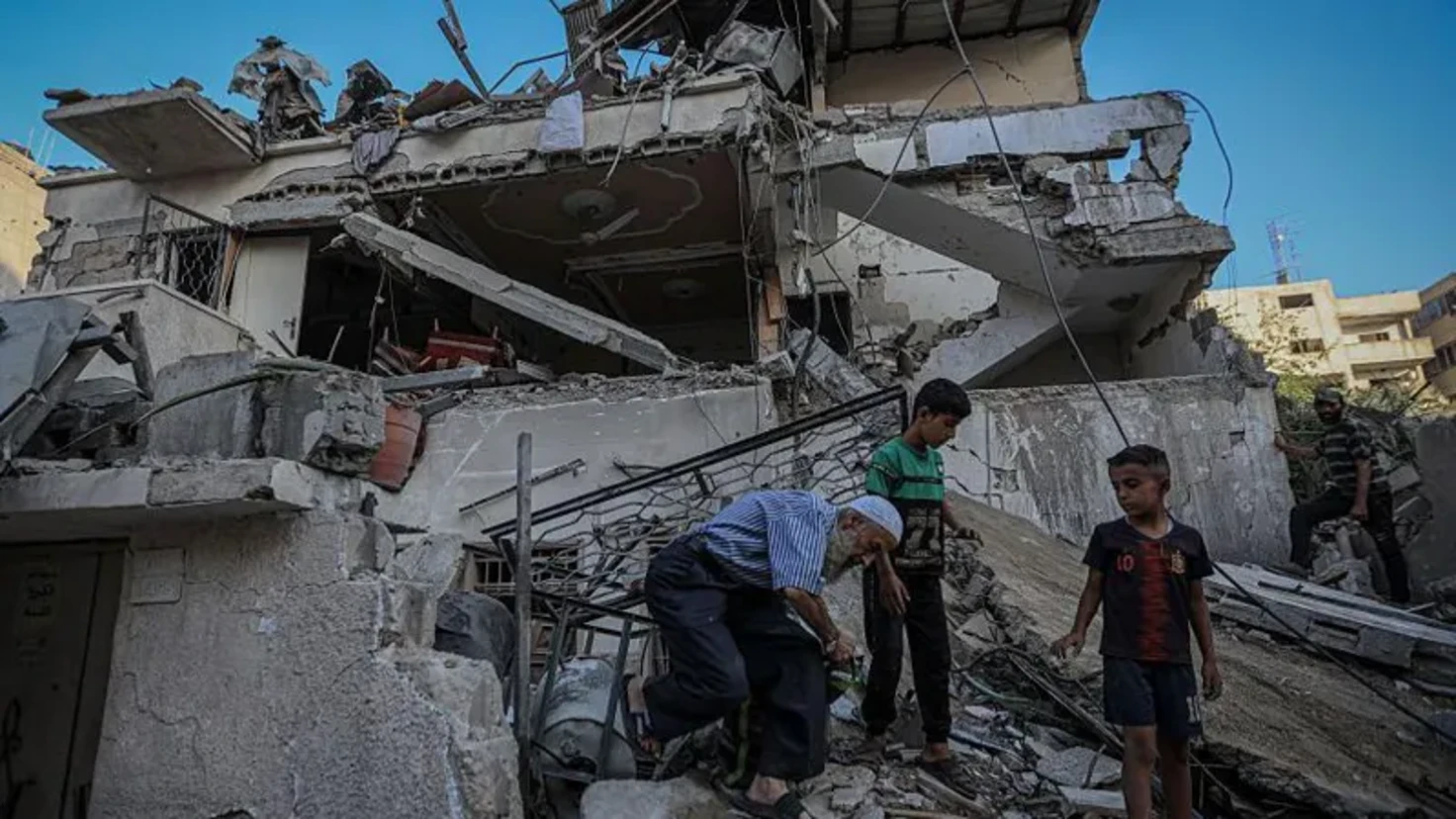Israel launches massive assault on Gaza City, calls up 60,000 reservists

Israel launches massive assault on Gaza City, calls up 60,000 reservists
Israel's military has commenced initial operations in Gaza City, calling up tens of thousands of reservists amidst growing international concern.
The Israeli military has announced the beginning of preliminary actions in a planned ground offensive aimed at capturing and occupying Gaza City. The operation is currently focused on the outskirts of the city, with troops already engaged in the Zeitoun and Jabalia regions, setting the groundwork for further advances.
Israeli Defence Minister Israel Katz sanctioned the planned offensive on Tuesday, with consensus from the country’s security cabinet expected later this week. Approximately 60,000 reservists are being mobilised for deployment, a move aimed at reinforcing active-duty personnel engaged in the operation.
Hamas, the governing body in Gaza, has accused Israel of undermining ceasefire negotiations in pursuit of what they term as a “cruel war against innocent civilians.” Reports from agencies, including Reuters, indicate that large-scale displacement of Palestinian residents is anticipated as preparations for Israel's military takeover advance.
French President Emmanuel Macron has voiced concerns about Israel's strategy, indicating that it could lead to a disaster for both Israeli and Palestinian populations and exacerbate regional instability. The International Committee of the Red Cross (ICRC) reported that any escalation in military actions may further deteriorate the critical humanitarian situation faced by Gaza's 2.1 million residents.
The escalation follows the breakdown of indirect negotiations with Hamas regarding a ceasefire and hostage release. Israel's Defence Forces (IDF) spokesperson, Brigadier General Effie Defrin, claimed that Hamas has already suffered substantial damage after more than 22 months of ongoing conflict. Defrin noted, “We will increase damage to Hamas's operational capabilities in Gaza City, targeting both its above and below-ground infrastructure.” He reassured that efforts are being made to minimise civilian harm by alerting the population to evacuate ahead of military actions.
In response, Mahmoud Bassal, a representative from the Hamas-controlled Civil Defence agency, described conditions in the Zeitoun and Sabra neighbourhoods as perilous. It was reported that Israeli military actions resulted in the deaths of 25 individuals across Gaza, including children from a family whose residence was struck in the Shati refugee camp.
Concern for hostages taken by Hamas persists, as Defrin affirmed that the IDF is taking steps to safeguard the 50 hostages still believed to be alive within Gaza, a situation that complicates military strategies. The ICRC reiterated that the conflict's intensification could result in further humanitarian catastrophe, threatening both civilian lives and those held captive.
“After months of relentless conflict, the people of Gaza are in a state of profound exhaustion. They require relief rather than additional hardship,” the ICRC stated, emphasising the need for immediate humanitarian access to essentials such as food, medical care, and clean water.
Mediators, including Qatar and Egypt, are actively seeking to broker a ceasefire, proposing a 60-day truce and the release of a substantial number of hostages. Hamas has indicated acceptance of the proposal, but Israel has not responded formally, with officials insisting that any agreement must be comprehensive to ensure the release of all hostages.
Tensions continue as Hamas has accused Israeli Prime Minister Benjamin Netanyahu of impeding ceasefire efforts, labelling him as the main obstacle to a resolution.
The current military actions by Israel follow a significant attack by Hamas on southern Israel on 7 October 2023, resulting in approximately 1,200 fatalities and further hostage situations. The Health Ministry in Gaza reports that over 62,000 people have died in the territory since the conflict began, with these figures cited as reliable by international observers, including the United Nations.
In Israel, the military faces challenges related to personnel mobilisations as the ongoing conflict has placed immense pressure on troops. While the Israeli government is increasing its reliance on reservists for the forthcoming operations, a recent survey indicated that a considerable percentage of soldiers have shown diminished motivation to serve.
Former IDF Chief of Staff, Lieutenant General Dan Halutz, has predicted that not all reservists may respond positively to the current call-up. This could lead to potential shortfalls in military manpower as the conflict progresses. Amidst these concerns, many in Israeli society are advocating for a ceasefire, reflecting widespread discontent regarding the ongoing hostilities.
Amidst the backdrop of conflict and heightened tension, calls for immediate humanitarian intervention and lasting peace continue to emerge from various quarters as the plight of Gaza's civilians remains precarious. The repercussions of this military operation will be closely observed by the international community, with the prospect of further escalation posing significant risks to both regional stability and humanitarian conditions in Gaza.
Israeli Defence Minister Israel Katz sanctioned the planned offensive on Tuesday, with consensus from the country’s security cabinet expected later this week. Approximately 60,000 reservists are being mobilised for deployment, a move aimed at reinforcing active-duty personnel engaged in the operation.
Hamas, the governing body in Gaza, has accused Israel of undermining ceasefire negotiations in pursuit of what they term as a “cruel war against innocent civilians.” Reports from agencies, including Reuters, indicate that large-scale displacement of Palestinian residents is anticipated as preparations for Israel's military takeover advance.
French President Emmanuel Macron has voiced concerns about Israel's strategy, indicating that it could lead to a disaster for both Israeli and Palestinian populations and exacerbate regional instability. The International Committee of the Red Cross (ICRC) reported that any escalation in military actions may further deteriorate the critical humanitarian situation faced by Gaza's 2.1 million residents.
The escalation follows the breakdown of indirect negotiations with Hamas regarding a ceasefire and hostage release. Israel's Defence Forces (IDF) spokesperson, Brigadier General Effie Defrin, claimed that Hamas has already suffered substantial damage after more than 22 months of ongoing conflict. Defrin noted, “We will increase damage to Hamas's operational capabilities in Gaza City, targeting both its above and below-ground infrastructure.” He reassured that efforts are being made to minimise civilian harm by alerting the population to evacuate ahead of military actions.
In response, Mahmoud Bassal, a representative from the Hamas-controlled Civil Defence agency, described conditions in the Zeitoun and Sabra neighbourhoods as perilous. It was reported that Israeli military actions resulted in the deaths of 25 individuals across Gaza, including children from a family whose residence was struck in the Shati refugee camp.
Concern for hostages taken by Hamas persists, as Defrin affirmed that the IDF is taking steps to safeguard the 50 hostages still believed to be alive within Gaza, a situation that complicates military strategies. The ICRC reiterated that the conflict's intensification could result in further humanitarian catastrophe, threatening both civilian lives and those held captive.
“After months of relentless conflict, the people of Gaza are in a state of profound exhaustion. They require relief rather than additional hardship,” the ICRC stated, emphasising the need for immediate humanitarian access to essentials such as food, medical care, and clean water.
Mediators, including Qatar and Egypt, are actively seeking to broker a ceasefire, proposing a 60-day truce and the release of a substantial number of hostages. Hamas has indicated acceptance of the proposal, but Israel has not responded formally, with officials insisting that any agreement must be comprehensive to ensure the release of all hostages.
Tensions continue as Hamas has accused Israeli Prime Minister Benjamin Netanyahu of impeding ceasefire efforts, labelling him as the main obstacle to a resolution.
The current military actions by Israel follow a significant attack by Hamas on southern Israel on 7 October 2023, resulting in approximately 1,200 fatalities and further hostage situations. The Health Ministry in Gaza reports that over 62,000 people have died in the territory since the conflict began, with these figures cited as reliable by international observers, including the United Nations.
In Israel, the military faces challenges related to personnel mobilisations as the ongoing conflict has placed immense pressure on troops. While the Israeli government is increasing its reliance on reservists for the forthcoming operations, a recent survey indicated that a considerable percentage of soldiers have shown diminished motivation to serve.
Former IDF Chief of Staff, Lieutenant General Dan Halutz, has predicted that not all reservists may respond positively to the current call-up. This could lead to potential shortfalls in military manpower as the conflict progresses. Amidst these concerns, many in Israeli society are advocating for a ceasefire, reflecting widespread discontent regarding the ongoing hostilities.
Amidst the backdrop of conflict and heightened tension, calls for immediate humanitarian intervention and lasting peace continue to emerge from various quarters as the plight of Gaza's civilians remains precarious. The repercussions of this military operation will be closely observed by the international community, with the prospect of further escalation posing significant risks to both regional stability and humanitarian conditions in Gaza.

Trump Put 'Sanctions on India' to End Ukraine War: White House
US officials state that sanctions were imposed on India as part of efforts to end the Ukraine war, citing India's significant oil trade with Russia.
| 2025-08-20

Trump Proposes Trilateral Meet With Putin, Zelensky
US President Donald Trump aims to arrange a pivotal meeting with Russian and Ukrainian leaders, focusing on peace talks amidst ongoing conflict.
| 2025-08-19

Allegations Against Shilpa Shetty and Raj Kundra over ₹60 Crore Fraud
Bollywood actor Shilpa Shetty and Raj Kundra face fraud accusations involving ₹60.4 crore, claimed by a businessman connected to their now-closed venture.
| 2025-08-15

Trump Says 25 percent chance Putin Summit Could Fail
US President Donald Trump anticipates a future three-party meeting on Ukraine's conflict while acknowledging potential meeting failures with Vladimir Putin.
| 2025-08-15

India's Trade Deficit Reaches Eight-Month High Amid Import Surge
India's merchandise trade deficit rose to over $27 billion in July as imports surged ahead of anticipated US tariff hikes.
| 2025-08-15




